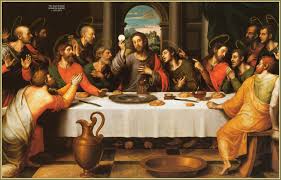Judas is an intriguing figure, perhaps not for the right reasons, but nonetheless, he’s given to us in the Gospels for a reason – mysterious words, that end in what is in many ways the worst betrayal in human history, handing over the very Son of God, the Word made Flesh, and our Redeemer, including that of Judas himself, had he repented. Judas had a kind of sorrow, but it was a ‘sorrow unto death’, as Saint Paul warns (2 Cor 7:10), and not unto salvation, as did Peter’s own.
Judas is a ‘type’ of the modern, signaling a quasi-virtue, false compassion and mercy – why was this not sold and given to the poor? – while hiding a far deeper, more insidious and sinister intention. Many say that his sin was avarice, but Venerable Bishop Fulton Sheen, who knew much of the human soul and its intentions, suggests that Judas’ apostasy came about not from the desire for filthy lucre – which is an old man’s vice – but rather from his refusal to believe in the Eucharist, and, by consequence, in the Word made Man. And, as Saint John warns, he who denies that Jesus came in the flesh is of the spirit of antichrist. And that spirit is now roaming around the world, seeking the ruin of many other souls.
I’ve always wondered about Our Lord’s words that it would have been better for that man not to have been born – our initial reply might be, then, why was he? Born, that is? But Judas had a choice to make, to make good of his life by his own choices, even making good of his evil. And that choice is before all of us, the way of life or the way of death. Choose life, then, that you may live.
Let us turn now, if you are amenable, to Bishop Sheen’s own inimitable take on Judas, which is well worth a listen in this Triduum time, perhaps as you are cleaning out the fridge, or garage, or re-organizing the kitchen, or baking some delightful treats for Easter. And may we all be ready for the great joy of that Solemnity of Solemnities.











